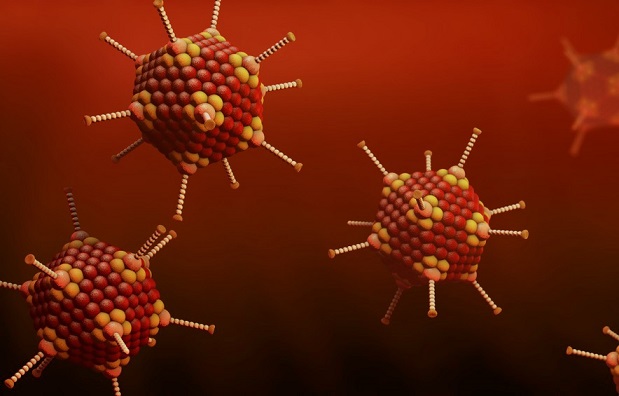Nikhil Prasad Fact checked by:Thailand Medical News Team Aug 21, 2025 5 months, 3 weeks, 3 days, 1 hour ago
Medical News: A New Path for Gene Therapy and Vaccines
Researchers from Umeå University, Lund University, the Laboratory for Molecular Infection Medicine Sweden (MIMS), Science for Life Laboratory (SciLifeLab), and the Umeå Centre for Microbial Research (UCMR) have uncovered a surprising discovery. A natural protein fragment known as lactoferricin (Lfcin) can greatly improve how adenoviruses infect and deliver genetic material into human skeletal muscle cells. This
Medical News report highlights how this finding could transform the way scientists approach vaccines and gene therapies.
 Lactoferricin Boosts Adenovirus Entry into Human Muscle Cells
Why Muscle Cells Matter in Medicine
Lactoferricin Boosts Adenovirus Entry into Human Muscle Cells
Why Muscle Cells Matter in Medicine
Adenoviruses are powerful tools used in many modern treatments, including gene therapies for muscle disorders and vaccines against diseases such as Ebola and COVID-19. But these viruses often struggle to enter muscle cells because the cells lack a common receptor called CAR. Without CAR, adenoviruses like HAdV-C5 cannot effectively attach and deliver their genetic cargo, limiting their usefulness.
The researchers showed that adding Lfcin increased adenovirus infection of both immature muscle cells (myoblasts) and mature muscle fibers (myotubes) by up to 30 times. This boost in efficiency is due to Lfcin helping the virus attach more easily to the cell surface.
How Lactoferricin Works
Lfcin is a small peptide released from lactoferrin, a protein found in human fluids like milk, saliva, and tears. It normally plays a role in immune defense and has known antiviral effects against pathogens such as SARS-CoV-2, RSV, and herpes viruses. The study found that when adenoviruses were combined with Lfcin before being introduced to muscle cells, infection rates skyrocketed. In fact, up to 100% of muscle cells could be infected under these conditions.
Importantly, this effect is specific to species C adenoviruses, which have a unique structure that allows them to interact strongly with Lfcin. Other types of adenoviruses did not benefit from this effect.
Shielding Viruses from Antibodies
Another challenge with adenovirus-based vaccines is that many people already carry antibodies against these viruses, which can neutralize them before they work. The study revealed that Lfcin also helps protect adenoviruses from these neutralizing antibodies. In lab tests, the presence of Lfcin reduced the ability of human serum to block adenoviruses by about 20 times. This means that Lfcin not only helps the virus attach to muscle cells but also shields it from being destroyed by the immune system too quickly.
Safe and More Effective Than Alternatives
Other positively charged molecules, like poly-L-lysine and spermidine, were also tested. While they could increase infection slightly, they were more toxic to cells at higher doses. Lfcin, on the other hand, remained safe and non-toxic at the effective concentrations, making it a far more promising option for medical use.
/>
What This Means for the Future
The discovery that Lfcin can dramatically improve adenovirus infection of muscle cells opens new doors for medical science. By enabling better gene delivery, researchers may develop more effective treatments for muscle-related genetic diseases, as well as stronger and longer-lasting vaccines. The dual ability of Lfcin to enhance virus entry and reduce antibody neutralization could help overcome two of the biggest barriers in adenovirus-based therapies.
This finding suggests that natural proteins like Lfcin could replace riskier synthetic chemicals currently being tested. As the researchers point out, optimizing how much Lfcin is used will be crucial, since very high doses cause viral particles to clump together and lose effectiveness.
Overall, this breakthrough shows that a naturally occurring human peptide might be the key to unlocking safer and more powerful viral therapies in the future.
The study findings were published in the peer reviewed journal npj Viruses (Nature Publishing Group).
https://www.nature.com/articles/s44298-025-00144-7
For the latest news, keep on logging to Thailand
Medical News.
Read Also:
https://www.thailandmedical.news/news/researchers-warn-about-immune-issues-associated-with-adenovirus-based-vaccines-or-therapeutics
https://www.thailandmedical.news/news/university-of-north-carolina-discovers-that-adenovirus-infections-can-cause-thrombocytopenia-could-new-strains-of-adenovirus-be-at-play
https://www.thailandmedical.news/news/german-researchers-say-johnson-and-johnson-s-and-astrazeneca-s-covid-19-vaccine-blood-clots-are-due-to-adenovirus-vector-issues-and-can-be-fixed
